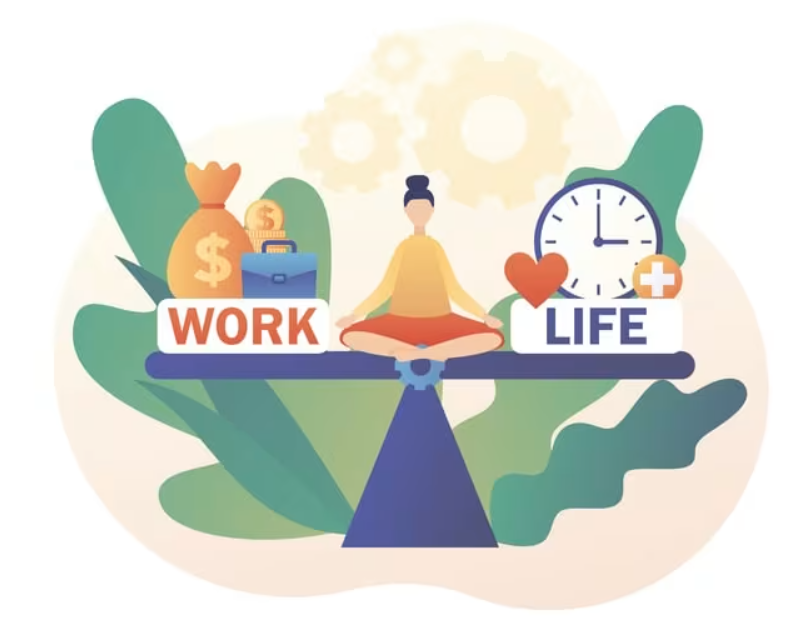In the hustle and bustle of modern life, balancing work and personal commitments can seem like a fleeting target. Many people find themselves overwhelmed by the demands of their careers while struggling to nurture personal relationships and interests. The constant push to meet professional obligations often neglects self-care and personal fulfillment. As work commitments grow, carving out time for activities that bring joy and relaxation can become challenging. However, with intentional strategies, creating a harmonious coexistence between your professional responsibilities and personal aspirations is possible, allowing for a more satisfying and enriched life.
Understanding the Importance of Work-Life Balance
The Impact of Imbalance
A lack of balance can have far-reaching consequences for mental and physical health. Burnout, decreased productivity, and strained relationships are just a few outcomes of neglecting personal well-being. When work consumes too much of your time and energy, it can leave little room for fulfilling personal activities. This imbalance affects your ability to perform at work and diminishes your overall quality of life. However, recognizing the signs of imbalance—such as chronic fatigue, irritability, or disconnection from loved ones—can bring relief, as it’s the first step toward making meaningful changes.
The Benefits of Balance
Striking a balance between work and life can lead to greater satisfaction in both areas. When prioritizing personal well-being alongside professional commitments, you create a more fulfilling existence that enhances your happiness. Achieving this harmony allows you to recharge, which fosters creativity and productivity in your work. Additionally, a balanced life contributes to stronger relationships and a more profound sense of purpose. Investing time in both your career and personal life ultimately enhances your ability to thrive in all aspects.
Recognizing Your Needs
You must recognize and prioritize your needs to foster a healthier balance. Reflecting on what aspects of your life require more attention can guide your efforts in achieving a more integrated lifestyle. Acknowledge the activities that enrich your life and make you happy outside work, such as hobbies, social interactions, or self-care practices. By understanding what nourishes you personally, you can make more informed choices about allocating your time and energy. This self-awareness will be pivotal in creating a balanced life that truly resonates with your values.
Setting Boundaries
Defining Your Priorities
To preserve a healthy balance between work and life, it is essential to define your priorities clearly. Determining what holds significance for you professionally and personally sets the foundation for effective boundary-setting. Reflect on your values, interests, and long-term goals, as this clarity will help you focus your time and energy on what enriches your life the most. Awareness of your priorities empowers you to make strategic decisions that align with your aspirations. This process of prioritization and boundary-setting is key to maintaining a fulfilling and balanced lifestyle, giving you a sense of control and confidence.
Creating Clear Boundaries
Establishing boundaries between work and personal time is vital for maintaining balance. Transparent communication with peers and supervisors about when you’re available can foster mutual respect for personal time. Setting specific work hours, taking breaks, and turning off notifications after a particular time can significantly enhance your personal space. By protecting this time, you create opportunities for relaxation, family engagement, and pursuing hobbies. Establishing these boundaries will allow you To reenter the workplace revitalized and ready to meet challenges head-on with renewed energy.
Enforcing Your Limits
Once you establish boundaries, it’s crucial to maintain them to ensure they are respected assertively. Being firm yet polite in reminding others of your availability and the importance of your time is essential for keeping these limits. Over time, this reinforcement will help cultivate respect for your boundaries among colleagues and family. If you are overwhelmed by work encroaching on your personal life, revisit these boundaries and adjust as necessary. Consistent enforcement will help protect your time and maintain a healthier work-life balance.
Effective Time Management
Prioritizing Tasks
Strong time management skills are key to maintaining balance and ensuring time is spent meaningfully. Start by prioritizing your tasks. Sorting tasks by priority and necessity lets you focus on what genuinely matters. Calendars or project management applications can help you maintain organization and visually manage your workload. Concentrating on high-priority tasks ensures that essential work gets done while freeing time for personal activities. This approach not only boosts productivity but also enhances your overall well-being.
Implementing Routines
Creating routines can streamline your day and enhance productivity significantly. Setting up a morning routine can inspire a positive outlook for the day, helping you start focused and energized. A structured evening routine can aid in unwinding, allowing you to transition smoothly from work to personal time. Additionally, incorporating regular breaks throughout your workday helps maintain focus and prevent burnout. Establishing consistent routines creates a framework supporting your professional and personal life.
Evaluating Your Time Use
Regularly evaluating how you spend your time is crucial for identifying areas where adjustments may be needed. Reflecting on your daily activities can help you understand whether your time allocation aligns with your priorities. Consider conducting weekly reviews to assess what worked well and what didn’t, allowing you to make informed decisions moving forward. This self-assessment process is not just a task but a proactive step that will enable you to refine your time management strategies. Ultimately, you can cultivate a more balanced and fulfilling lifestyle by proactively evaluating your time use and feeling more in charge of your life.
Embracing Flexibility
Adapting to Change
Flexibility is key in navigating the demands of work and life, particularly in today’s ever-changing environment. Embrace the reality that plans may change and unexpected challenges may arise at any moment. Being open to adapting your schedule, such as rearranging tasks or adjusting work hours, or approaching, like seeking support from colleagues or family, empowers you to deal with stress more successfully and maintain a positive outlook. This adaptability is crucial for responding to personal needs or family commitments without feeling guilty about work obligations. By cultivating a mindset of flexibility, you create a more balanced and resilient life.
Utilizing Remote Work Opportunities
With the increase in remote work opportunities, many individuals now have the chance to design a work environment that suits their personal needs. Taking advantage of flexible work arrangements can significantly enhance your work-life balance. Consider adjusting your work hours to accommodate personal responsibilities or finding a workspace that boosts productivity. Remote work options allow you to incorporate personal tasks into your day seamlessly. You can create a more satisfying balance between your professional and personal life by leveraging these opportunities.
Improving Your Daily Routine by Relocating
Relocating closer to your workplace can significantly improve your work-life balance by reducing your commute and freeing time for leisure, family, and self-care. Before making the move, assess your needs regarding housing and quality of life, ensuring the new area aligns with your personal and professional goals. Consider hiring a moving company to streamline the relocation process, making it less stressful and more efficient. As you transition, communicate with your employer and colleagues to maintain professional relationships and embrace the fresh start while allowing yourself time to adjust. An encouraging community can elevate your experience and contribute to a more balanced life.
Learning to Let Go
Part of embracing flexibility is learning to relinquish rigid expectations regarding your work and personal life. Accept that not everything will go according to plan and recognize that adapting your approach as circumstances change is okay. Letting go of perfectionism allows you to enjoy the journey and reduces stress related to unmet expectations. Cultivating this mindset of adaptability can lead to greater peace of mind. Ultimately, learning to let go can enhance your overall quality of life.
Prioritizing Self-Care
Making Time for Yourself
Self-care is fundamental for maintaining harmony in a rigorous world. Make it a priority to engage in activities that nourish your mind, body, and soul, recognizing that this time is not indulgent but necessary. Whether exercising, meditating, reading, or spending quality time with loved ones, dedicating time to yourself is crucial for recharging your energy. When you prioritize self-care, you effectively equip yourself to handle work and personal life demands. Ultimately, this investment in yourself leads to a more fulfilling and balanced existence.
Seeking Support
Don’t shy away from asking for support from teammates, friends, or family, as sharing your struggles and triumphs can be incredibly beneficial. Engaging in conversations about work-life balance with peers can provide valuable perspectives and encourage shared strategies. This strong sense of belonging can enhance accountability and remind you that you are not alone in this journey. Consider forming support groups or informal check-ins with trusted friends to discuss challenges and solutions. By seeking support, you create a network that reinforces your commitment to balance.
Practicing Mindfulness
Embracing mindfulness practices in your routine can significantly enhance your self-care efforts. Practicing mindfulness lets you stay centered and concentrated, reducing stress and improving overall well-being. Consider taking moments throughout your day to breathe deeply, reflect, or engage in simple mindfulness exercises. These practices help ground you amidst the chaos of daily life. Making mindfulness a routine can cultivate a greater sense of peace and balance.
Conclusion
Striking a balance between work and personal life is an ongoing process that requires intentionality and flexibility. You can create a balanced coexistence between your professional and personal life by defining boundaries, optimizing time management, and valuing self-care. Relocating closer to work can also be a powerful strategy in this pursuit, providing you with the time and energy needed to enhance both aspects of your life. Remember, achieving balance is not about perfection; it’s about making conscious choices that reflect your values and priorities. Embrace the process, celebrate your progress, and recognize that a fulfilling life is within reach.















